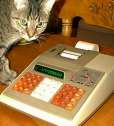Texas Instruments SR-56
| Datasheet legend
Ab/c:
Fractions calculation
AC: Alternating current BaseN: Number base calculations Card: Magnetic card storage Cmem: Continuous memory Cond: Conditional execution Const: Scientific constants Cplx: Complex number arithmetic DC: Direct current Eqlib: Equation library Exp: Exponential/log functions Fin: Financial functions Grph: Graphing capability Hyp: Hyperbolic functions Ind: Indirect addressing Intg: Numerical integration Jump: Unconditional jump (GOTO) Lbl: Program labels LCD: Liquid Crystal Display LED: Light-Emitting Diode Li-ion: Li-ion rechargeable battery Lreg: Linear regression (2-var. stats) mA: Milliamperes of current Mtrx: Matrix support NiCd: Nickel-Cadmium recharg. batt. NiMH: Nickel-metal-hydrite rech. batt. Prnt: Printer RTC: Real-time clock Sdev: Standard deviation (1-var. stats) Solv: Equation solver Subr: Subroutine call capability Symb: Symbolic computing Tape: Magnetic tape storage Trig: Trigonometric functions Units: Unit conversions VAC: Volts AC VDC: Volts DC |
| ||||||||||||||||||||||||||||||||||||||||||||||||||||||||
 I don't know whether the SR-56 calculator was designed before or after the SR-52, but it certainly looks like a little brother of Texas Instrument's first magnetic card programmable. The SR-56 has no magnetic cards, only 10 registers and 100 program steps, but it has the same 10+2 digit display, same appearance, and a keyboard layout similar to that of the SR-52. On the other hand, it has a few features the SR-52 lacks, such as a t-register for comparison tests, which became standard in later Texas Instruments units; this, along with the model number, suggests that the SR-56 came out sometime after the SR-52. It wasn't a long-lived model either; it was replaced by the TI-57 in a relatively short time, which perhaps explains why there are few SR-56s around these days. I was lucky to obtain one in very good condition recently (albeit without any manuals or accessories.)
I don't know whether the SR-56 calculator was designed before or after the SR-52, but it certainly looks like a little brother of Texas Instrument's first magnetic card programmable. The SR-56 has no magnetic cards, only 10 registers and 100 program steps, but it has the same 10+2 digit display, same appearance, and a keyboard layout similar to that of the SR-52. On the other hand, it has a few features the SR-52 lacks, such as a t-register for comparison tests, which became standard in later Texas Instruments units; this, along with the model number, suggests that the SR-56 came out sometime after the SR-52. It wasn't a long-lived model either; it was replaced by the TI-57 in a relatively short time, which perhaps explains why there are few SR-56s around these days. I was lucky to obtain one in very good condition recently (albeit without any manuals or accessories.)
Like other first-generation Texas Instruments programmable calculators, the SR-56 was also compatible with the PC-100 printer/security cradle.
100 unmerged program steps is not a heck of a lot. I was wondering whether this calculator had the horsepower to support a moderately complex program, such as an implementation of the Gamma function. In the end, although I had to use a shoehorn, I was able to squeeze in a program that calculated the Gamma function's natural logarithm for positive arguments. In order to do this, I had to rearrange the formula used and introduce a few optimizations specifically designed for the algebraic logic (with operator precedence) of TI calculators.
The program presented here requires that memory registers 3-9 be filled with a predefined set of values. These are presented here with 12 digits of precision. You can only key in ten digits in direct entry, but you can generate 12-digit constants as shown by the following two examples:
11 EE 11 +/- + 2.506628275 = STO 3
.8676043424 + 83 = STO 4
To use this program, key in an argument and hit RST R/S. Remember, the result is the Gamma function's logarithm; to calculate the actual value, hit ex.
M3: 2.50662827511
M4: 83.8676043424
M5: 1168.92649479
M6: 8687.24529705
M7: 36308.2951477
M8: 80916.6278952
M9: 75122.6331530
00 33 STO
01 01 1
02 64 ×
03 34 RCL
04 03 3
05 84 +
06 34 RCL
07 04 4
08 94 =
09 64 ×
10 34 RCL
11 01 1
12 84 +
13 34 RCL
14 05 5
15 94 =
16 64 ×
17 34 RCL
18 01 1
19 84 +
20 34 RCL
21 06 6
22 94 =
23 64 ×
24 34 RCL
25 01 1
26 84 +
27 34 RCL
28 07 7
29 94 =
30 64 ×
31 34 RCL
32 01 1
33 84 +
34 34 RCL
35 08 8
36 84 +
37 34 RCL
38 09 9
39 54 ÷
40 34 RCL
41 01 1
42 94 =
43 54 ÷
44 01 1
45 35 SUM
46 01 1
47 34 RCL
48 01 1
49 54 ÷
50 01 1
51 35 SUM
52 01 1
53 34 RCL
54 01 1
55 54 ÷
56 01 1
57 35 SUM
58 01 1
59 34 RCL
60 01 1
61 54 ÷
62 01 1
63 35 SUM
64 01 1
65 34 RCL
66 01 1
67 54 ÷
68 01 1
69 35 SUM
70 01 1
71 34 RCL
72 01 1
73 54 ÷
74 52 (
75 34 RCL
76 01 1
77 84 +
78 01 1
79 94 =
80 64 ×
81 92 .
82 05 5
83 35 SUM
84 01 1
85 34 RCL
86 01 1
87 45 yx
88 52 (
89 34 RCL
90 01 1
91 74 -
92 05 5
93 94 =
94 13 lnx
95 74 -
96 34 RCL
97 01 1
98 94 =
99 41 R/S


